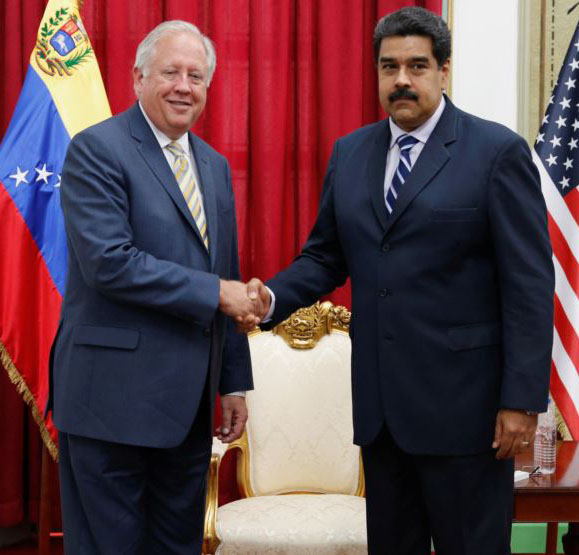CARACAS (Reuters) – A senior US diplomat yesterday met with Venezuelan President Nicolas Maduro as part of an effort to support dialogue between the government and the opposition amid an escalating political standoff and a worsening economic crisis.
The arrival of Tom Shannon, US Under Secretary of State for Political Affairs and an expert on Latin America, may help spur negotiations between the two sides, which over the years have repeatedly held talks that generated few concrete results.
Venezuelan state television briefly showed images of Shannon shaking hands with Maduro and speaking informally with other ruling Socialist Party officials in the Miraflores presidential palace.
“His visit will underscore our support for the ongoing dialogue process, and our interest in the well-being of the Venezuelan people,” said the State Department in an earlier statement, adding he would stay until November 2.
The United States has for more than a decade been at ideological loggerheads with Venezuela’s socialist government.

Maduro and opposition leaders agreed to move ahead in talks that were organized with support from the Vatican following a meeting that began Sunday evening and stretched into dawn yesterday.
Maduro’s adversaries accuse him of creating a dictatorship by blocking a recall referendum on his rule and of illegally overriding the legislature, which was taken over by the opposition in a landslide election last year.
The opposition insists the government allow a recall referendum on the unpopular Maduro’s rule, release dozens of jailed opposition activists and respect Congressional decisions.
Maduro, who is struggling to control shortages of consumer goods and soaring prices in an unraveling socialist economy, says he is a victim of opposition conspiracies to overthrow him and of an “economic war” led by businesses with the backing of Washington.
Shannon has in recent years worked to ease long-running tensions between Caracas and Washington.
He helped contain fallout from US sanctions against Venezuelan officials in 2015, and last year spearheaded an effort to create informal channels of communication between the State Department and top Venezuelan officials.
The United States has stepped up diplomatic efforts with Venezuela since 2014, when US President Barack Obama put in motion a process of restoring relations with communist-run Cuba after more than 50 years of economic embargo.
Shannon faces a difficult situation in Venezuela, where the two sides show few signs of agreement on a path forward and have repeatedly failed to reach consensus through bilateral talks.
Jesus Torrealba, head of the opposition coalition, said early yesterday that dialogue cannot continue without “concrete and immediate action in the coming days with respect to the release of political prisoners.”
Four major opposition parties have joined the talks. The influential Popular Will party, led by jailed former mayor Leopoldo Lopez, did not join, insisting the government had not shown enough respect for human rights.
The two sides will create four commissions to continue discussing specific issues.
Venezuela’s congress is currently conducting a largely symbolic trial of Maduro to declare him politically responsible for the country’s crisis and formally declare that he has violated democratic principles.
The opposition is also scheduled to march to the presidential palace this week, following massive demonstrations last week and a national strike on Friday that was only partially observed even by government critics.
